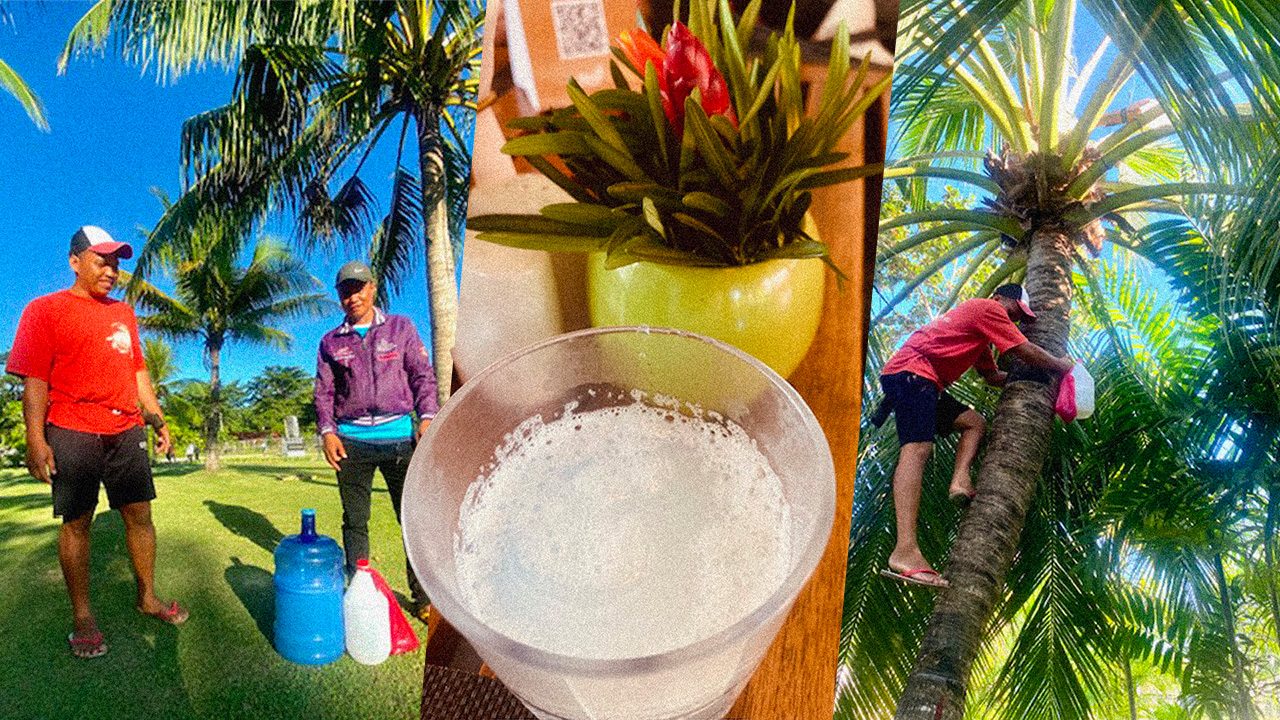SUMMARY
This is AI generated summarization, which may have errors. For context, always refer to the full article.

DAVAO DE ORO, Philippines – On any lazy day in rural Visayas or Mindanao, it is easy to find titos and kuyas in someone’s backyard at seven in the morning, squatting or standing around a makeshift table under a sky of coconut trees, enjoying newly gathered tuba.
Tuba, of course, is the alcoholic drink made from coconut sap popular in these islands, reddish or white and cloudy depending on how it is made. Left untouched for a day, tuba tastes a happy mix of sour and sweet and tangy. But freshly gathered and fermented for not more than half a day, it is sweet, almost juice-like, with a diffused scent of fermenting sugars.
It is this kind of tuba that welcomed me to Kopiat Island in Mabini, Davao de Oro. On vacation with family, tuba was an unexpected but happy surprise, sort of like a reunion with a childhood friend. I had grown up sampling tuba gathered by an uncle who has since passed. Every morning without fail, in good weather or in bad, holiday or not, he would shimmy up the coconut trees that surround our home, collecting tuba that had dripped overnight into these containers he fashioned out of big bamboo stems. These containers he would put under the tree’s inflorescence (the emerging flowers that turn into fruit) which he would tie together and slice thinly twice a day. Some days he would climb those trees one after the other early in the morning. On most days, however, he would spend time with each tree and climb down flushed, like a shy boy surprised by a girl he fancied.
Intrigued, I asked about the tuba from the welcoming party and I was directed towards Clarice Fajardo, hotel assistant manager of Dusit Thani’s Lubi Plantation Resort, who said that other guests, especially foreign tourists, love it as well. It is customary to offer drinks and refreshments to arriving guests and Fajardo said they first started giving tuba as complimentary drinks in 2022. Coconut trees are plentiful in the island and locals have long collected tuba, as is usual in rural areas. So it was logical to make tuba from the resort’s own coconut trees a herald of the guests’ stay in the island, she said.
“When you visit Russia, they have vodka; France, they have wine. In the Philippines, we have tuba,” Fajardo said.
I told Fajardo I wanted to see how they collected their tuba and was told to meet the manangguete the next day at 6:30 am. Manangguete is a person who extracts coconut tree sap that is fermented to make tuba.
So I was up early the next morning and met with Fajardo who was to introduce me to Robel Canon, the resort’s manangguete. Canon is 34 years and and hailed from the nearby village of San Antonio. Canon as with fellow manangguete Renante Jamo-ay, who is 38 and lived in his village.
Canon said that each morning, they collect some 10 liters of sap from 21 native and Thai dwarf coconut trees. Canon said they do not add tungog, the additive that gives tuba its reddish color. Tungog is the dried bark of a certain type of mangrove tree. Aside from giving the tuba a reddish tinge, it also imparts a tangy aftertaste preferred by some drinkers.
“There is no additive in ours so what you drink is pure and fresh,” Canon said in Visaya.
Jomo-ay said they also make sure to serve only tuba that is not more than 12 hours old. That way, the tuba is only just beginning to ferment and retains its sweetness. Tuba this young is only about 2% alcohol.
I asked Fajardo what they do with the excess tuba. She said it is turned into vinegar for use in the resort’s three restaurants and employees’ canteen.
Some more banter (and two small glasses of the day’s tuba) and I thanked them for their time and turned to go. On the way to the beach I couldn’t help but think, if only mornings in the city were like this? – Rappler.com
JB R. Deveza is an Aries Rufo fellow.
Add a comment
How does this make you feel?





There are no comments yet. Add your comment to start the conversation.